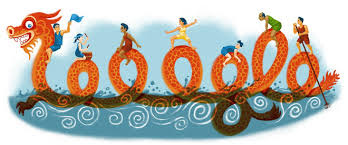- Duanwu
The Dragon Boat Festival

- Vrsula Le Guin

Ursula Kroeber Le Guin is an American author of novels, children's books, and short stories, mainly in the genres of fantasy and science fiction. She has also written poetry and essays. First published in the 1960s, her work has often depicted futuristic or imaginary alternative worlds in politics, the natural environment, gender, religion, sexuality and ethnography.
She influenced such Booker Prize winners and other writers as Salman Rushdie and David Mitchell – and notable science fiction and fantasy writers including Neil Gaiman and Iain Banks. She has won the Hugo Award, Nebula Award, Locus Award, and World Fantasy Award, each more than once. In 2014, she was awarded the National Book Foundation Medal for Distinguished Contribution to American Letters.Le Guin has resided in Portland, Oregon, since 1959
- The Ones Who Walk Away from Omelas
"The Ones Who Walk Away from Omelas" is a 1973 plotless, short, descriptive work of philosophical fiction, popularly classified as a short story, by Ursula K. Le Guin. With deliberately both vague and vivid descriptions, the narrator depicts a summer festival in the utopian city of Omelas, whose prosperity depends on the perpetual misery of a single child.

"The Ones Who Walk Away from Omelas" was nominated for the Locus Award for Best Short Fiction in 1974 and won the Hugo Award for Best Short Story in 1974.
- The Giver
The Giver is a 1993 American young-adult utopian novel by Lois Lowry. It is set in a society which at first appears to be a utopian society but is later revealed to be a dystopian one as the story progresses.
The novel follows an 11-year-old boy named Jonas. The society has eliminated pain and strife by converting to "Sameness," a plan that has also eradicated emotional depth from their lives. Jonas is selected to inherit the position of Receiver of Memory, the person who stores all the past memories of the time before Sameness, as there may be times where one must draw upon the wisdom gained from history to aid the community's decision making. Jonas struggles with concepts of all the new emotions and things introduced to him: whether they are inherently good, evil, or in between, and whether it is even possible to have one without the other. The Community lacks any color, memory, climate and terrain, all in effort to preserve structure, order, and a true sense of equality beyond personal individuality
- Parable
A parable is a succinct, didactic story, in prose or verse, which illustrates one or more instructive lessons or principles. It differs from a fable in that fables employ animals, plants, inanimate objects, or forces of nature as characters, whereas parables have human characters. A parable is a type of analogy.
Some scholars of the canonical gospels and the New Testament apply the term "parable" only to the parables of Jesus,though that is not a common restriction of the term. Parables such as "The Prodigal Son" are central to Jesus' teaching method in the canonical narratives and the apocrypha.
 The Return of the Prodigal Son, by Rembrandt.
The Return of the Prodigal Son, by Rembrandt.
- Utopia

A utopia is an imagined community or society that possesses highly desirable or nearly perfect qualities. Utopian ideals often place emphasis on egalitarian principles of equality in economics, government and justice, though by no means exclusively, with the method and structure of proposed implementation varying based on ideology. According to Lyman Tower Sargent "[t]here are socialist, capitalist, monarchical, democratic, anarchist, ecological, feminist, patriarchal, egalitarian, hierarchical, racist, left-wing, right-wing, reformist, free love, nuclear family, extended family, gay, lesbian, and many more utopias".
The word was coined by Sir Thomas More from the Greek language for his 1516 book Utopia (in Latin), describing a fictional island society in the Atlantic Ocean. The term has been used to describe both intentional communities that attempt to create ideal societies, and the imagined societies portrayed in fiction. Alternative views on structural and qualitative attributes of society have spawned other concepts, most prominently dystopia.




 留言列表
留言列表


